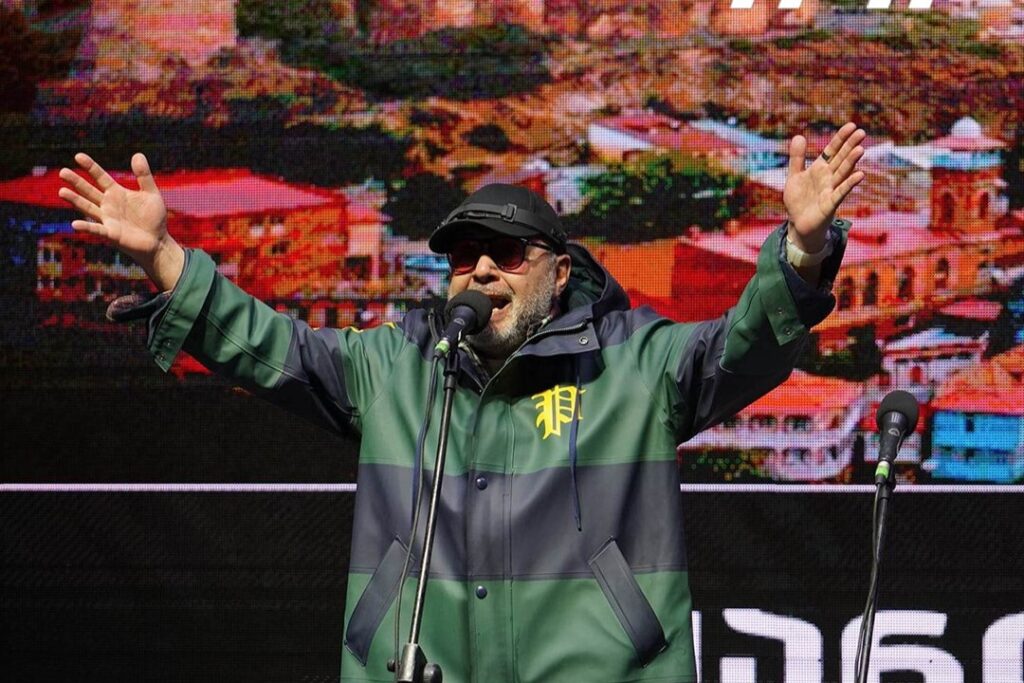Thousands of Georgians gathered on Sunday on the First Republic Square in Tbilisi to attend a demonstration organised by Gia Gachechiladze, a conservative media personality better known by his nickname Utsnobi (‘unknown’).
Aside from being a well-known pop singer, Gachechiladze is an ardent supporter of the Georgian Dream-led government and a vocal opponent of its domestic and foreign critics. Two years ago, he briefly reappeared on the political stage with a similar rally but with arguably more obscure demands.
‘Thank you God for the peace in our country, gratitude to all those who defend peace with their own teeth […] whatever the pressure!’, Gachechiladze said in his speech on Sunday’s rally, parroting ruling party claims that the West was attempting to ‘create a second front’ in Georgia in support of Ukraine against Russia.
Later that night, Gachechiladze denied the gathering was against Georgia’s Western partners and argued that he and his supporters were ‘followers of Christian Europe’.
Gachechiladze’s ally, Vato Shakarashvili, with whom he co-launched an online conservative portal last year, was more outspoken about Georgia’s potential foreign policy options.
‘We should consider which of two options — neutrality and non-allegiance or unrealistic goals and dreams of joining any of the military alliances — guarantees the maintenance of security and peace in this new global system’, Shakarashvili said in his speech at the rally.
Anti-Western political forces in Georgia have long advocated for military neutrality; outright advocacy for an alliance with Russia remains a taboo as the vast majority of the Georgian public appears to strongly support greater links with the EU and NATO instead.
Leaders of the ruling party praised Gachechiladze’s rally before and after it took place for its ‘patriotic spirit’ and support of the government’s pursuit of ‘peace’.
[Read more on OC Media: Russia’s top diplomat compliments Georgia for not ‘irritating’ them]

For ‘sovereignty’
Most of the rally’s speakers, including Gachechiladze, focused on claims that Georgia’s Western partners were infringing on its sovereignty — a regular talking point used by the ruling party in response to international criticism of their performance.
‘We unequivocally demand full non-interference in [Georgia’s] domestic public and political affairs’, Georgian actor Zaza Papuashvili, one of the rally’s co-organisers, said onstage.
Papuashvili called on ‘politicians of the European Union and other countries to respect Georgia’s state sovereignty’.
The Georgian government has come under increased scrutiny by the West since it failed to gain EU membership candidacy last summer.
Since the rejection, Tbilisi was given a list of ‘priorities’ to address as a precondition for reconsidering giving it candidate status. Among the 12 recommendations was the implementation of a ‘transparent and effective judicial reform strategy’.
Earlier in April, Washington sanctioned senior Georgian judicial officials over corruption and ‘undermining the rule of law’, a move the Georgian Government condemned as an ‘interference’ in Georgia’s judiciary.
Against ‘LGBT propaganda’
Several speakers at the rally also made homophobic remarks during their speeches, including conservative politician Soso Manjavidze who condemned ‘LGBTQ propaganda’ and the growing ‘acceptance of transgenderism’ in Georgia.
By the end of the event, the rally’s principal demands were distilled into a list read out by Zaza Papuashvili, which also featured anti-queer themes.
Papuashvili opened the list by asserting that everyone should be treated equally under the law ‘regardless of political or sexual orientation’, an apparent reference to a common conservative claim in Georgia that queer and liberal Georgians enjoy legal advantages.
The allegation first emerged following Georgia’s adoption of anti-discrimination legislation in 2014. It resurfaced in response to opposition to the prosecution of Lazare Grigoriadis — a foreign agent law protester accused of throwing Molotov cocktails at the police.
Pro-government media came under fire for its coverage of the Grigoriadis trial, as it appeared to have largely focused on Grigoriadis’ dyed blond hair, use of cosmetics, and other physical attributes to shape public opinion against him.
Papuashvili concluded his speech by demanding that ‘LGBT propaganda’ be banned in Georgia.
Later that day, Giorgi Gachechiladze indicated that the recent foreign agent law protests were on his mind and suggested holding referendums to settle contentious topics.
‘Let’s ask people, and these problems will be solved. There will be no more […] bashing of each other’s heads and throwing Molotov cocktails in this country’, he insisted.
Alt Info, a violent far-right group, had similarly suggested using binding referendums to decide controversial legal initiatives in mid-March. The group’s suggestion came within days of the massive anti-foreign agent law protests in Tbilisi.
[Read more on OC Media: Pro-Russian extremists burn flag of Europe from Georgian Parliament]
The demands to the government also included a halt to ‘ideological brainwashing of the youth’ in the education system, which Papuashvili did not elaborate on.
The demands also included a call for the Georgian government to deliver a 'political and legal judgement on the dictatorship’, referring to the 2003–2012 government of the United National Movement party (UNM). Several illiberal groups in Georgia have sought to outlaw the UNM, the country’s largest opposition group, since Georgian Dream replaced them in 2012.




 1 May 2023
1 May 2023



